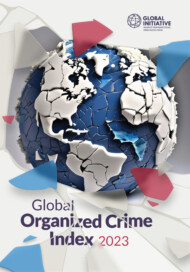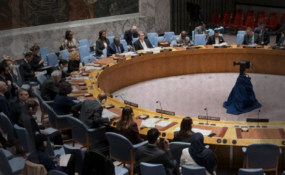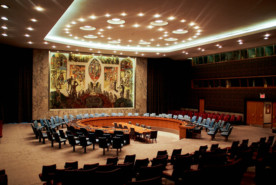Posted on 21 Dec 2023
On 7 December 2023, the UN Security Council (UNSC) held a debate on transnational organized crime. Member states highlighted the need for better analysis of illicit economies, particularly in conflict zones, and for more effective and coordinated responses. The crucial role of civil society, including the contributions of the Global Initiative Against Transnational Organized Crime (GI-TOC), was also recognized.
The UNSC meeting, convened by the UNSC’s Ecuadorean presidency (which is notable, given Ecuador’s recent surge in violence related to organized crime), featured briefings and remarks by the UN Secretary-General, António Guterres; the executive director of the UN Office on Drugs and Crime, Ghada Waly; the director of Harvard University’s Weatherhead Center for International Affairs, Melani Cammett; and the founder of the NGO Women in Action for Women, Victoria Nyanjura.
The GI-TOC annually reviews UNSC resolutions for references to forms of organized crime and presents its findings in the form of an interactive research tool. Our analysis shows how, since 2000, increasing attention has been given to the impacts illicit economies have on peace and security, particularly within country-specific resolutions on the Council’s agenda. Although issues related to illicit economies are increasingly intertwined with the mandates of the UNSC, this meeting offered the Council a rare opportunity to focus on transnational organized crime in a more overarching way.
Guterres highlighted three priority areas to curb transnational organized crime: international cooperation; strengthening the rule of law; and improving prevention and promoting inclusion. He highlighted the impact of organized crime in conflict-affected countries such as Afghanistan, Colombia, Haiti, Myanmar and Somalia. Haiti was flagged several times during the meeting, underscoring the gang violence and criminal activities that have besieged the country.
Waly focused on supporting and improving data collection, integrating measures against organized crime into UNSC resolutions on peace and security, a sustainable development cooperation framework and the need for the Council to pay more attention to transnational organized crime. Professor Cammett highlighted the impact of organized crime on democracy, including reduced voter turnout, threats to freedom of expression and lack of social and political trust.
More than 60 member states spoke at the meeting, including Mexico, South Africa, Ecuador, Turkey and Russia, all five of which are among the top 20 countries in the world most affected by criminality, according to the findings of the GI-TOC’s Global Organized Crime Index 2023.
The outcome of the meeting was the adoption of a statement that largely lists the efforts already being made by the Council and the wider UN to curb organized crime. However, some points highlight the need for new approaches to understanding and responding to illicit economies. These include:
- A clear recognition of the security threats posed by transnational crime, including to post-conflict states, which undermine state authority.
- The need to improve international cooperation and to adopt ‘distinct strategies’ as part of ‘comprehensive and balanced’ approaches.
- Recognition of the increasing decentralization and diversification of criminal networks.
- The need for the UN system to act in a more coordinated manner to improve its effectiveness.
- The need for greater analysis of the ‘criminal networks which support transnational organized crime and terrorism’.
- Recognition of the key role of civil society in raising awareness and addressing threats of terrorism.
Switzerland noted how the GI-TOC has contributed to analyzing the work of the UNSC on transnational organized crime, saying:
‘The Geneva-based GI-TOC has done the maths. In almost half of its resolutions in 2022, this Council mentioned organized crime and illicit transactions’.
Likewise, Austria stated:
‘Only by working together with youth can we ensure that they become an asset rather than part of the problem: through innovative and fresh ideas, and approaches to strengthening integrity and raising awareness of the harms of corruption and organized crime. We commend the crucial work of civil society organizations, such as the GI-TOC, in this regard.’
At a time of gridlock and discord in the Security Council, the issue of transnational organized crime reveals a degree of shared interest and common ground among member states. However, while they are concerned about the problem, there are few fresh ideas on what to do about it. Moving forward, this debate has opened the door to a greater emphasis on analyzing political economies of organized crime in the context of peace operations, the need for a more active involvement of civil society in preventing and reducing the harms caused by organized crime, and a more strategic and multilateral approach to tackling a threat that defies borders and the rule of law.
The GI-TOC will play its part by continuing to analyze how the Council is addressing illicit economies, and will contribute through its own political economy analysis in key countries of interest to the UNSC – such as Haiti, Ukraine and other conflict zones around the world. In addition, our continued work to put in place the building blocks of a global strategy against transnational organized crime can assist the Council and the UN more broadly in efforts to achieve its peace and security mandates, and sustainable development goals.



